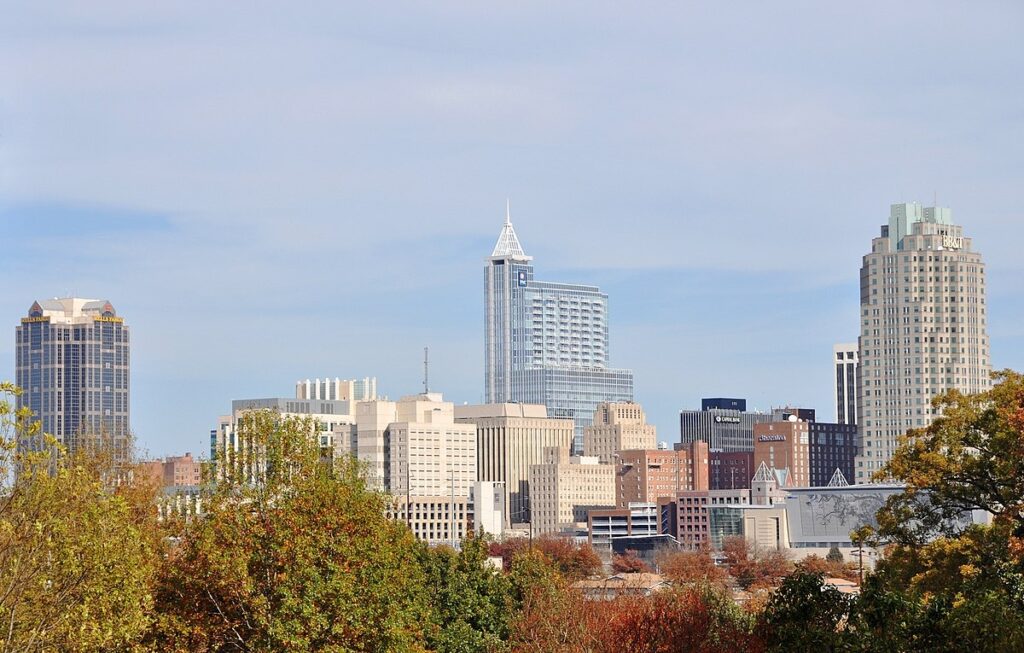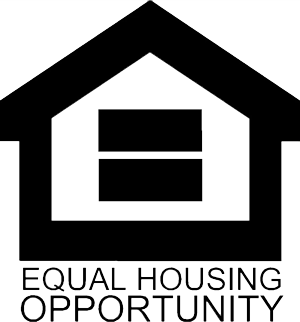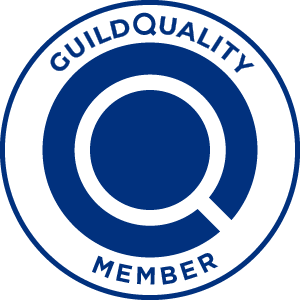Living in Raleigh, NC
Are you thinking of moving to Raleigh, NC? In this article, we’ll delve deeper into the insights you need to make an informed decision about relocating to this vibrant city.
We will look closer at Raleigh’s climate, cost of living, job market, educational opportunities, neighborhoods, transportation options, cultural attractions, and more.
So, whether you’re already set on living in Raleigh NC or exploring the idea, read on! We’ll guide you to everything you need to know about the City of Oaks.
Raleigh's Climate and Weather
One factor that makes Raleigh, North Carolina, an appealing place to live is its diverse and relatively mild climate. The city experiences all four seasons, allowing residents to enjoy various outdoor activities throughout the year.
Residents can expect hot summers, mild winters, and ample precipitation year-round. The city receives an average of 47 inches of rainfall annually, spread evenly throughout the year. Snowfall is relatively rare, with an average of just a few inches per year, making Raleigh an excellent choice for those who prefer milder winters.
Raleigh is also a city not immune to Carolina hurricanes. Hurricane season typically runs from June to November. During this time, residents are expected to stay vigilant, stay informed about weather updates, and be prepared for potential hazards like flooding

Cost of Living in Raleigh
At a glance, Raleigh offers a lower cost of living than the national average. Housing, often the most significant monthly expense for most households, tends to be more affordable in Raleigh than in other major US cities. You can find a mix of older, charming homes, newly constructed apartments, and condos catering to the influx of new residents.
Transportation in Raleigh is also relatively affordable. While many residents still rely on their cars due to the city’s sprawling nature, the public transportation options are growing. The city has made significant investments in expanding bus services and promoting alternative methods of transportation like biking.
Regarding everyday expenses, such as groceries, dining out, and entertainment, Raleigh offers a moderate price range. You can find various dining options, from affordable local eateries to upscale restaurants. Raleigh generally provides a cost of living that allows residents to enjoy a high quality of life while balancing their budgets effectively.
Raleigh's Job Market and Economy
Raleigh and cities Durham and Chapel Hill form the renowned Research Triangle. With the Research Triangle Park (RTP) nearby, the city has seen an influx of tech companies, ranging from startups to well-established giants. It has led to Raleigh often being dubbed the “East Coast’s Silicon Valley.” The presence of tech industries, including software development, IT services, and biotechnology, has attracted talent from across the country, positioning the city as a competitive force in the technology world.
Raleigh is home to a robust healthcare and pharmaceutical sector, anchored by world-class institutions like the Duke University Medical Center and UNC Health Care.
Additionally, Raleigh’s financial services sector is thriving, with many banks and financial institutions establishing significant operations within the city. Being in the state’s capital, the government also offers numerous employment opportunities, from administrative to specialized roles.
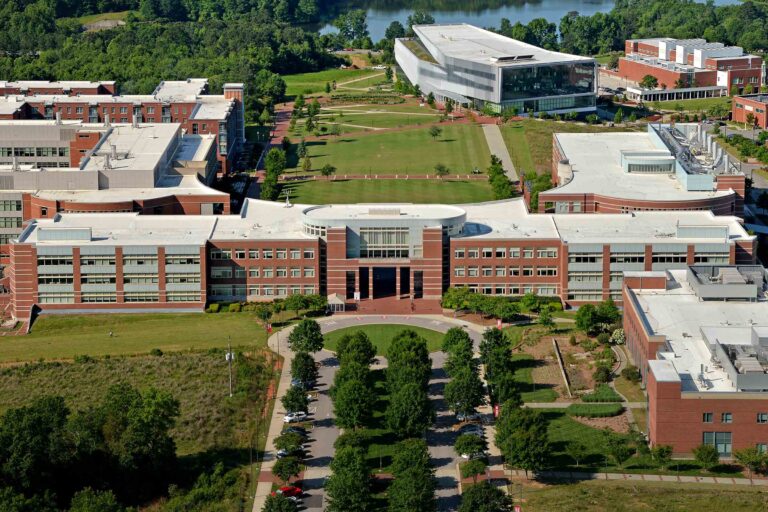
Education and Schools in Raleigh
One of the highlights of Raleigh’s education scene is its robust public school system. The Wake County Public School System is one of the state’s largest and most innovative school districts. With over 190 schools and a commitment to academic excellence, WCPSS provides a comprehensive education to more than 160,000 students. Its emphasis on personalized learning and a diverse curriculum ensures that students have access to a well-rounded education.
Raleigh is fortunate to host several esteemed colleges and universities for those seeking higher education. North Carolina State University, part of the renowned Research Triangle, is a leading institution in engineering, technology, and agriculture.
In the broader Research Triangle, Raleigh is joined by Durham and Chapel Hill, which house Duke University and the University of North Carolina at Chapel Hill. In proximity to Raleigh, these institutions further bolster the city’s reputation as a hub for academic excellence and research.
Neighborhoods and Housing in Raleigh
Some of Raleigh’s most popular neighborhoods include Five Points, Oakwood, and Cameron Park. Five Points is well-loved for its historic homes and local boutiques. At the same time, Oakwood is renowned for its preserved Victorian houses and tree-lined streets. On the other hand, Cameron Park appeals to many with its proximity to North Carolina State University and its mix of Colonial Revival and Craftsman homes.
In terms of housing options, Raleigh caters to a variety of preferences and budgets. Downtown Raleigh has seen a surge in modern apartments, perfect for those looking to be in the heart of the city’s action. These apartments often have amenities like fitness centers, rooftop lounges, and community spaces.
For those who prefer more space and privacy, single-family houses are plentiful in the city’s residential neighborhoods, offering backyards and a more suburban feel.
Condos have also become increasingly popular, particularly among young professionals. These properties provide homeownership with reduced maintenance and often include communal amenities like pools and recreation areas.
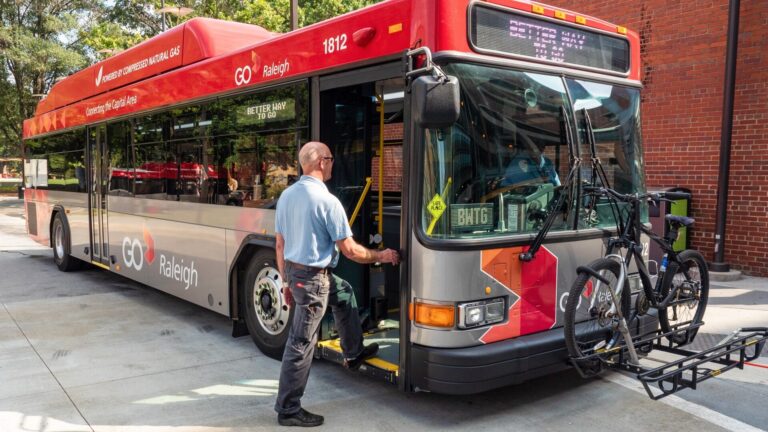
Transportation in Raleigh
When navigating Raleigh, many transportation options are available to residents and visitors alike. Public transportation, operated by GoRaleigh, provides a network of bus routes across the city and its neighboring areas. These buses are cost-effective and eco-friendly for daily commutes, shopping trips, or leisurely exploration.
The city has also been investing in expanding its public transit infrastructure, with plans for more frequent service and potentially new modes of transport.
However, like many American cities, Raleigh is largely car-centric. Those using personal vehicles might find the traffic situation relatively manageable compared to larger metropolitan areas. Still, rush hours, particularly on major highways, can be congested.
Beyond cars, the city has been working to expand its bike lanes on urban roads, making it safer and more convenient for cyclists. Raleigh’s downtown is particularly walkable for pedestrians, with wide sidewalks, pedestrian-friendly signals, and plenty of crosswalks. Efforts have been made to ensure that areas around schools, parks, and other public spaces are accessible and safe for walkers and bikers.
Healthcare and Hospitals in Raleigh
The availability of healthcare services in Raleigh is both diverse and comprehensive. Residents can access many primary care physicians, specialists, urgent care centers, and diagnostic facilities. The city’s strategic location and prominence mean that individuals from neighboring towns and other states often travel to Raleigh for medical consultations and treatments.
When it comes to top-tier medical facilities, Raleigh boasts several. The Rex Healthcare system, for instance, offers a wide range of services and has been consistently recognized for its quality of care, patient satisfaction, and innovative medical practices.
WakeMed Health and Hospitals, another essential institution, operates multiple centers around the city, including its main campus, which houses specialized facilities such as a children’s hospital, heart center, and trauma center.
These institutions, along with others in the city, provide cutting-edge medical care and play significant roles in medical research and education.

Cultural Scene in Raleigh
Raleigh boasts a rich tapestry of arts and cultural attractions. For instance, the North Carolina Museum of Art offers an expansive collection ranging from ancient to contemporary pieces. It is accompanied by an outdoor park displaying large-scale art installations.
When it comes to music and entertainment, Raleigh hits all the right notes. The Red Hat Amphitheater hosts numerous concerts throughout the year, featuring a diverse lineup of artists and bands. For those who prefer indoor acoustics, the Duke Energy Center for the Performing Arts is a hub for classical music, ballet, opera, and theater.
Raleigh’s cultural vibrancy also shines through its array of festivals and events. Each year, the Artsplosure festival transforms the city streets into a massive celebration of art, music, and community, featuring local artisans, performers, and interactive installations.
Among film enthusiasts, the Longleaf Film Festival showcases a curated selection of short and feature-length films, celebrating the art of cinema. And when fall arrives, the North Carolina State Fair becomes the focal point, drawing crowds from across the state for rides, shows, and classic fair food.
Outdoor Activities in Raleigh
Raleigh is a green city filled with numerous parks and recreational spots. Pullen Park, one of the oldest parks in the U.S., offers families a delightful mix of playgrounds, paddle boats, and even a historic carousel.
Another standout is Dorothea Dix Park, which hosts events and provides breathtaking views of the downtown skyline.
For hiking and biking enthusiasts, Raleigh offers an extensive network of trails. The Capital Area Greenway System is a testament to the city’s commitment to outdoor recreation, connecting over 100 miles of trails and pathways and allowing residents to traverse woodlands, lakesides, and urban areas.
Many of these trails are multi-use, accommodating walkers, runners, cyclists, and even equestrians in certain areas.
The city is also home to several golf courses, tennis courts, and athletic fields catering to sports enthusiasts of all ages. If you’re looking for a beach, the Wrightsville beach is the closest and is a 2-hour drive from the city.

Tips for Relocating Smoothly to Raleigh
Relocating can be both an exciting adventure and a daunting task. However, with some preparation and the right approach, you can make your transition smooth and stress-free.
Familiarizing yourself with Raleigh’s neighborhoods, traffic patterns, and general lifestyle is essential. This knowledge will help you decide where to live, work, or send your kids to school. Resources like local blogs, city websites, and virtual tours can be invaluable. Consider a trip to the city to explore potential neighborhood schools or get a feel for its vibe.
If you’re purchasing a home, factor in property taxes; if you’re renting, remember potential deposits or renters’ insurance.
Ready to make Raleigh your home? Whether you want to purchase the perfect property or build on your lot, we’re here to make your dream home a reality. As expert home builders passionate about crafting beautiful spaces, we’re your partners in this exciting journey. Don’t wait – contact us today or learn more, and let’s bring your vision to life!


